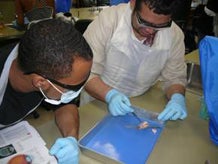
MISSION STATEMENT
The Department of Life Sciences provides students with a high-quality education focusing on biological principles and apprising students about current issues in life sciences and healthcare.
We understand that teaching practice is never completely under the control of the instructor but exists in the interaction between the instructor and the learner (Teemant & Pinnegar, 2019).
- We value and respect contribution from all learners.
- We provide rigorous curricula that are rooted in assessment-driven best practices.
- We foster critical thinking skills through scientific inquires and solving authentic cases.
- We strive to engage students with meaningful activities, stimulating discussions and impactful research.
- We cultivate the awareness of global concerns and actions in our local communities.
COURSES OFFERED
|
|
Department Learning Outcomes
- Conduct scientific experiments using principles of scientific inquiry and common laboratory equipment
- Demonstrate the skill to assess and analyze data
- Apply Understanding of scientific methods to interpret published scientific studies conducted by researchers
- Describe key properties and common processes in all living organisms.
- Relate the homeostasis maintained by cellular processes (Biology) or various organ systems (Human Biology) to their structures
- Examine the interactions between the processes of evolution and diseases or ecology
- Describe the impact of biological issues on the adoption of social practices globally
- Incorporate viewpoints and information from global or diverse sources
ORGANIZATIONS AND PARTNERSHIPS
We also benefit from various partnerships. With the support from MXC health science programs, our students have experienced virtual patient technology in classroom. Rush Medical School has generously sponsored our student visits to their human cadaver lab.
Life Sciences Faculty & Staff Directory
Department Chairs
Imran Khan, Assistant Professor
Office: 2401-N / ikhan36@ccc.edu
Marcela Bernal-Munera, Instructor
Office: 2401-L / mbernal-munera@ccc.edu
Faculty
Ashraf Ali, Instructor
Maaly Bassiony, Instructor
Chiju Chen, Assistant Professor
Bethany Elkington, Instructor
Marwa Elnahas, Instructor
Office: 2401-094 / melnahas@ccc.edu
Peter Grudzien, Assistant Professor
Tracie Hudson, Assistant Professor
Azmia Javed, Assistant Professor
Fatima Javed, Instructor
Ryan Manow, Instructor
Erin McMurray, Associate Professor
Ghulam Saadat, Instructor
Inderroop Singh, Instructor
Avni Thaci, Instructor
Sheila Wicks, Instructor
